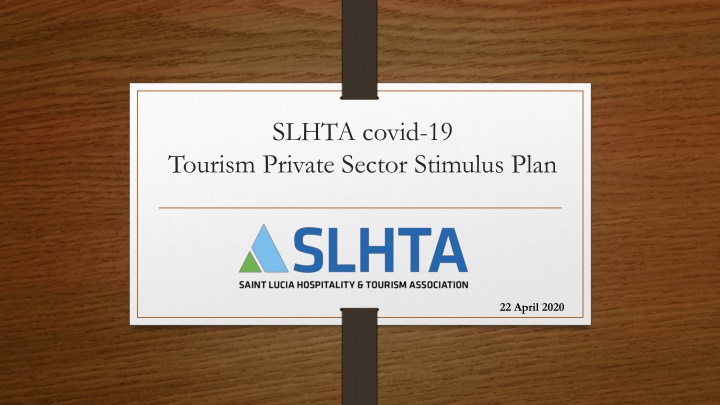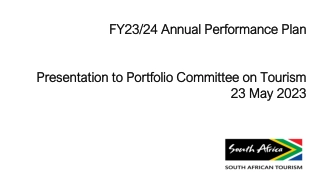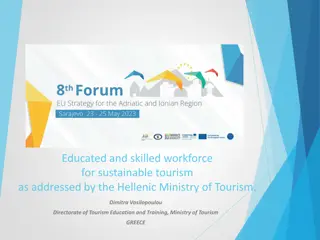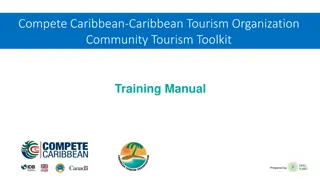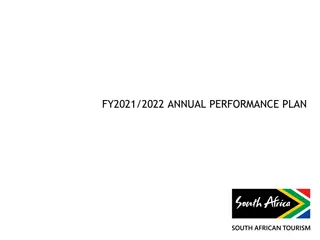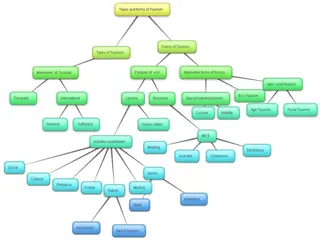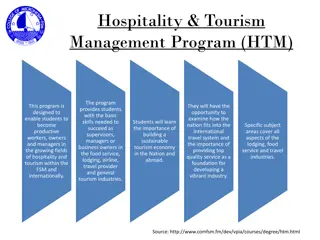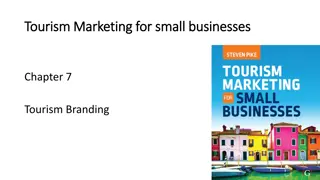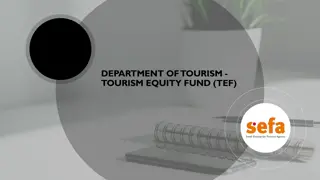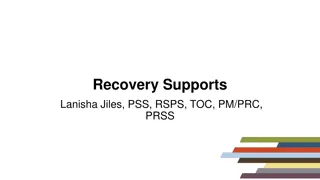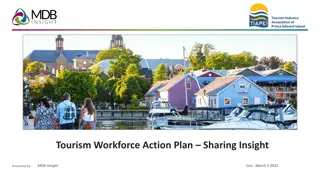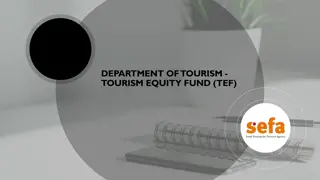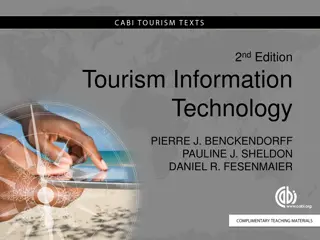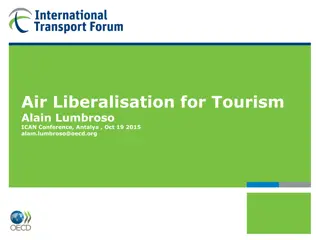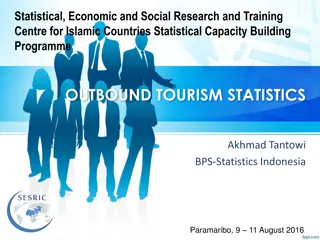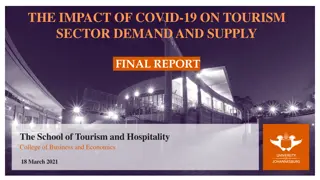Impact of COVID-19 on Tourism Industry and Recovery Plan
The tourism industry faces a crisis with no end in sight, requiring bailouts and financial support to survive. Small-medium enterprises are at risk, with limited access to finance. Recovery is anticipated to be slow, with lower occupancy rates and decreased revenue until 2022. Strategies include workforce rotation, negotiations for lower wages, and additional costs to meet post-COVID standards. The industry will become highly competitive, leading to possible price reductions and varying recovery rates among sectors.
Download Presentation

Please find below an Image/Link to download the presentation.
The content on the website is provided AS IS for your information and personal use only. It may not be sold, licensed, or shared on other websites without obtaining consent from the author.If you encounter any issues during the download, it is possible that the publisher has removed the file from their server.
You are allowed to download the files provided on this website for personal or commercial use, subject to the condition that they are used lawfully. All files are the property of their respective owners.
The content on the website is provided AS IS for your information and personal use only. It may not be sold, licensed, or shared on other websites without obtaining consent from the author.
E N D
Presentation Transcript
SLHTA covid-19 Tourism Private Sector Stimulus Plan 22 April 2020
Contents 1. Introduction Current State of the Industry 2. Managing the Crisis and Mitigating the Impact 3. Providing Stimulus & Accelerating Recovery 4. Preparing for Tomorrow
1. State of the Tourism Industry 1.1 Crisis open-ended ending of crisis not yet in sight 1.2 Current moratoriums of 6 months may need to be extended 1.3 Massive industry bail out required, locally and globally 1.4 Survival of small-medium enterprises questionable 1.5 Hotel indebtedness/ limited access to new finance 1.6 New finance critical to survival and possible investment in plant to upgrade or make more sustainable
1. State of the Tourism Industry contd 1.7 Liability insurances do not cover pandemics 1.8 Cost of operations ongoing, to maintain and secure physical plants 1.9 Slow recovery curve anticipated 1.10 Lower ADR s and Revpar until 2022 1.11 High cost of operations a concern with low occupancies and operating at a loss 1.12 Lay offs will affect work force beyond 12 weeks
1. State of the Tourism Industry contd 1.13 Even with work force rotation, redundancies unavoidable 1.14 Lower wages and salaries will need to be negotiated 1.15 Reopening scenarios, additional cost to upgrade to post Covid standards of operation 1.16 Essential marketing expenditure for both destination and private sector to attract business
1. State of the Tourism Industry contd 1.17 Recovery will lead to extremely competitive regional and global market 1.18 Price reductions may not be avoidable 1.19 Recovery will not be same for each sector. Luxury and villas may bounce back quicker, as may special interest. Recovery of cruise essential to parts of the industry. Non-formal accommodation may bounce back quicker than large hotels.
1. State of the Tourism Industry contd 1.20 March/April/ May/ June: Zero arrivals/ zero business at least until July 1.21 July October: Very slow recovery period, dependent on travel advisories and health and safety considerations, forecasted occupancies around 25-35% 1.22 November 2020 - April 2021 : 50-65% Occupancy
2. Managing the Crisis & Mitigating the Impact 2.1 Reduce lower cost of flights by reducing landing fees and facilitation charges at HIA 2.2 Six-month moratorium of principal and interest on all existing loans and mortgages for individuals and businesses who are directly impacted. This may require a further extension. 2.3 Defer payment of utilities (electricity, water and telecommunications) 2.4 Suspend disconnection of all utilities for 12 months
2. Managing the Crisis & Mitigating the Impact contd 2.5 All Government owned property management companies to provide a moratorium or discounted rent retroactive 1st March 2020 30th November 2020. 2.6 Suspend PAYE for all professionals whose employment status and salaries have been directly impacted by COVID-19 for 6 months 2.7 Suspend NIC contributions for all companies who have had to suspend trade as a result of COVID-19 for 6 months
3. Providing Stimulus & Accelerating Recovery 3.1 Provide Duty Free waivers on all construction materials and cleaning equipment not produced locally 3.2 Provide duty-free concessions to ALL independent restaurants and hotel restaurants on a basket of goods which are NOT produced in Saint Lucia 3.3 Expand Corporate Tax Holiday to ALL non-accommodation enterprises for up to 3 years.
3. Providing Stimulus & Accelerating Recovery contd 3.4 Provide a dollar for dollar tax credit to all companies who have extended assistance and provided benefits to employees from 13th March 2020 1st July 2020. 3.5 Delay the Accommodation Head Tax for at least 12 months and consider VAT reduction to 7% on rooms, meals and other tourism related services. 3.6 Cap Brokerage fees for imports to less than 0.05% of value for one year. 3.7 Exempt locally produced items from VAT charges from 1st April 2020 31st December 2020
3. Providing Stimulus & Accelerating Recovery contd 3.8 For the cruise dependent sector, establishment of a low interest loan facility for working and reinvestment capital. 3.9 Duty free concessions on imported tourism transportation vehicles and parts no older than 5 years. 3.10 Suspend property taxes for 12 months 3.11 Stimulus package to local manufacturers and a strong buy local campaign to include incentives to increase procurement of goods and supplies from local manufacturers, who may be able to pass on savings from Government support, and greater use of alternative energy equipment
3. Providing Stimulus & Accelerating Recovery contd 3.12 Consider resilience cruise tax 3.13. Accelerate registration, standardization and taxation on non formal accommodation sector and other emerging, sharing tourism services
4. Preparing for Tomorrow 4.1 Enhance Private Sector Resilience through support from Green Grants 4.2 Marketing consideration and support to be provided to small and medium sized firms seeking to promote their offerings in the international market. 4.3 Promote skills development, especially digital skills 4.4 SLHTA should sit on an Economic and Tourism Recovery Task Force. 4.5 Include tourism in national, regional and global economic emergency packages
4. Preparing for Tomorrow contd 4.6 Collaborate with international and local partners to enforce rapid testing protocols for visitors and staff 4.7 Enhance Public Health Rapid Response Team 4.8 Place sustainable tourism firmly on the national agenda 4.9 Allocate travel and tourism with specific funding lines within Emergency Funds and Programmes to support the most affected companies so that they can avoid bankruptcy and restart operations after the emergency.
4. Preparing for Tomorrow contd 4.10 Provide small, well-targeted, non-refundable grants for small businesses, the self- employed and entrepreneurs. 4.11 Review, rationalize and overhaul all taxes, charges and levies impacting on tourism, transport and related activities. 4.12 Travel vouchers instead of cash refunds: Legislation required to cap refunds as per Italian model
4. Preparing for Tomorrow contd 4.13 Collaborate with SLHTA and regional partners to develop training modules for every segment of the tourism sector to familiarize, educate and prepare for new behavioral and operational requirements post COVID-19 4.14 Come back smarter: Provide unemployed workers access to free online training and certification 4.15 Retrain some of the work force that may not be re-employed in their previous jobs
4. Preparing for Tomorrow contd 4.16 Rationalize all planned infrastructural investments and divert financing to stimulate the economic sectors where most needed 4.17 Review governance and finance mechanisms of Tourism Authority and Village Tourism Council and allow for inclusion of SLHTA appointed representatives. 4.18 Use Tourism Advisory Council strategically to play their part in the recovery of the tourism sector. Review opportunities to invest in new tourism niche markets. 4.19 Fast track protection of coastal and marine environments and introduce legislation to address use conflicts
5. OECS Led Initiatives 5.1 In collaboration with the ECCB, ensure that the deferment of loan payments will not result in these borrowings being classified as non- performing or delinquent. This will be a benefit to the Banks. 5.2 Encourage the Banks, as an industry, to allow loans to hospitality companies to be restructured, providing for lower LIBOR rates of interest, and longer repayment terms or balloon payments at the end of the loans, to reduce loan payments after the 6-month deferment.
5. OECS Led Initiatives contd 5.3 Negotiate a Resolution Hospitality Loan Facility, whereby the loans from hospitality companies can be taken over by a special-purpose institution, run by the ECCB, and guaranteed by the countries from which the loans emanate. This will allow the companies to access new loan financing, without the securitization or repayment of the old borrowings. The new facility could repackage the debt into bonds that would be held by the respective countries, or floated on international capital markets, or multi- lateral financial institutions.
5. OECS Led Initiatives contd 5.4 Negotiate with Banks and Governments to allow the hospitality company borrowings to be converted into Redeemable Preference Shares by the companies, issued to the Governments, and converted by Governments into long-term bonds which would be issued to the Banks for the borrowings. The shares would only be redeemed if future conditions allowed but would rank ahead of common shares for dividends paid by the companies in the future.
5. OECS Led Initiatives contd 5.5 Wage and salary cuts, supported by social stabilization programmes that provide the employees with a guaranteed income if they are laid-off, furloughed or have their wages and salaries reduced for a period of 6 12 months. 5.6 Agreements with utility and telecommunication companies that would defer an element of the costs of energy, water and telecommunications.
5. OECS Led Initiatives contd 5.7 Shared marketing programmes for the destination that would reduce or contain the marketing costs for individual properties, while allowing for robust marketing of the destination and the properties. 5.8 Duty waivers and VAT reductions on the importation and local purchase of the most significant inputs and resources.
6. Opportunities 6.1 Regional market 6.2 Staycations 6.3 Reducing cost of operations by smart investments 6.4 Coming back more resilient: Access to green funding and grants for private sector/ debt conversion for better energy efficiency and water and waste water management 6.5 Grow local, Buy Local, Eat Local : Expand linkages
